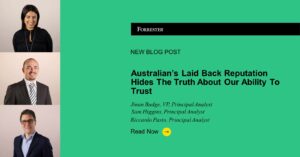Australians’ Laid-Back Reputation Hides The Truth About Our Ability To Trust
People are hardwired to trust other people and, by extension, the organizations they engage with. As an organization, your success or failure at earning and keeping trust ultimately determines not only the fate of your relationship with customers, employees, and partners but the future prospects of the organization itself.
But few business, political, or technical leaders truly understand the mechanics of trust and how to benefit from it. Cue Forrester’s “trust imperative” research in 2021, which provided a concrete model for organizations to strengthen trust in their brand and build enduring bonds with customers. The research also identified seven levers of trust (accountability, consistency, competence, dependability, empathy, integrity, and transparency) that enable organizations to define an optimal mix across these levers, depending on their business model.
This year, the research team in Australia banded together to examine the state of trust in Australia in 2022 (Forrester clients can read more here). Our goal was to give leaders insight and guidance on the significant commercial and social impacts of trust within an Australian context. We also wanted to highlight what shapes trust for different industries based on their relevance to, and role in, people’s lives.
Of course, if you believed the stereotype of an easy-going, laid-back larrikin who values “mateship,” then Aussies must be some of the most trusting on the planet …
But the reality is far richer. Leveraging Forrester’s Consumer Trust Imperative Survey, 2022, we were able to dive deep into each of the seven levers and what they mean for five industry types: commonly used products, luxury goods, consumer tech, primary banks, and the government.
So what did we find?
- Australians trust people, but they are risk-averse and slow to trust brands. Fifty-four percent of Australian online adults agreed that most people have good intentions. They are slow to trust new brands and organizations, with 47% of adults confirming this. This could be due to Australia’s history of major corporate collapses involving fast-growing brands led by larger-than-life personalities, including Christopher Skase’s Qintex group. And with so very few of us enjoying taking risks, this may reduce our openness to the new ideas and opportunities that new firms offer.
- Australians wholeheartedly reject contradictions between words and actions. Twenty-five percent of Australians will stop doing business — permanently — with a company whose actions are out of line with its words. Similar repercussions occur when an organization’s actions are out of line with its customers’ values. For example, by 2022, 99 of the 100 top ASX companies stopped holding Australia Day sales, likely fearing backlash from consumers who had come to recognize the problems with celebrating a day that marked the beginning of the dispossession and oppression of — and violence against — indigenous peoples.
- Transparency in Australia is a significant lever of trust for all industry types. While we often talk about transparency, very few of us understand its real value or use it as an asset. It turns out that transparency is the second-most important lever for luxury firms, which really shouldn’t be a surprise — transparency is a stepping stone toward sustainable and ethical fashion. Yet only 42% of Australian consumers are confident that luxury brands are transparent with their practices. Even worse, only 28% of Australians said that the government is transparent, no doubt impacted by news such as this.
There’s so much more to unpack from this study but only so much blog space to share it all, so we’ll leave you with this final thought: As a leader, you can (and must) take practical steps to strengthen trust. This is key for both seizing the opportunities that improved trust can create and minimizing the risks of violating that trust.
If you are a Forrester client, please schedule time with Jinan Budge, Sam Higgins, or Riccardo Pasto to learn more.

